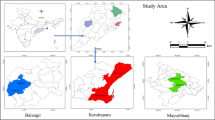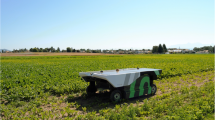Abstract
In a number of surveys, Canadian farmers have found the absence of information to be a major obstacle to the development of sustainable agriculture. The traditional sources of information for farmers have been unable to provide them with suitable information. One reason for this deficiency is the absence of suitable training for agriculture professionals. The details of a newly created course designed to address these problems at the Faculty of Agriculture of McGill University are provided, and some suggestions made about the pedagogy and course content of an entire program.
Similar content being viewed by others
References
Altieri, Miguel A.Agroecology: the Scientific Basis of Alternative Agriculture. 2nd edition. Boulder, CO: Westview Press, 1987.
Bloom, Benjamin S. (ed.).Taxonomy of Educational Objectives, Handbook I: Cognitive Domain. New York: David McKay Co., 1956.
Busch, Lawrence and William B. Lacy.Science, Agriculture, and the Politics of Research. Boulder, CO: Westview Press, 1983.
Buttel, Frederick H., “Agriculture, Environment, and Social Change: Some Emergent Issues.” Pp 453–88 inThe Rural Sociology of the Advanced Societies. Ed. by Frederick H. Buttel and Howard Newby. Montclair, NJ: Allanheld, Osman, 1980.
Cox, George W. and Michael D. Atkins.Agricultural Ecology. San Francisco: W. H. Freeman, 1979.
Douglass, Gordon K. (ed.)Agricultural Sustainability in a Changing World Order. Boulder, CO: Westview Press, 1984.
Dover, Michael and Lee M. Talbot.To Feed the Earth: Agroecology for Sustainable Development. Washington: World Resources Institute, 1987.
Harwood, Richard R., “International Overview of Regenerative Agriculture.” Pp 24–35 inProceedings of a Workshop on Resource-Efficient Farming Methods for Tanzania. Ed. by Mike Brusko. Emmaus, PA: Rodale Press, 1983.
Hill, Stuart B., “Diversification and Agricultural Sustainability.” Pp 89–106 inSunrise Agriculture in the Northeast: Foundations for a Sustainable Agriculture in the 21st Century. Maine Agricultural Experiment Station Miscellaneous Publication #694. Orono, ME: University of Maine, 1987.
“Sustainable Human Development: Driving and Restraining Forces in the Food System.” A submission to the World Commission on Environment and Development.Regional Priorities 1(2 1986): 2–6.
Organic Farming in Canada. Ecological Agriculture Projects Research Paper 4. Ste. Anne de Bellevue, QC: Ecological Agriculture Projects, 1984.
Kramer, Dee, “Problems Facing Canadian Farmers Using Organic Methods.” Pp 129–62 inPesticide Policy: the Environmental Perspective. Ed. by Ted Schrecker and Ray Vles. Ottawa: Friends of the Earth, 1984.
Leiss, William.The Domination of Nature. New York: George Braziller, 1972.
Lewin, Kurt (1947), “Force Field Analysis.” Pp 115–7 inManagement of Organizational Behavior. Ed. by Paul Hersey and Ken Blanchard. Englewood Cliffs, NJ: Prentice Hall, 1982.
Mahoney, Michael.Scientist as Subject: the Psychological Imperative. Cambridge: Ballinger, 1976.
Miller, Alan, “Tunnel Vision in Environmental Management.”The Environmentalist 2 (1982): 223–31.
Robinson, Paul.Searching for Alternative Solutions: Sustainable Agriculture. Policy Branch Working Paper. Ottawa: Agriculture Canada, 1986.
.Effects of a Transition to Ecological-organic Agriculture on Livestock Production in Manitoba. Unpublished M.Sc. Thesis. Winnipeg: University of Manitoba, 1985.
USDA.Report and Recommendations on Organic Farming. Washington: Superintendent of Documents, 1980.
Additional information
Stuart B. Hill is Associate Professor, Department of Entomology in the Agriculture Faculty of McGill University, and Director of Ecological Agriculture Projects located within the Agriculture Faculty. He has authored numerous papers in the academic and popular press on sustainability in agriculture and sustainable human development.
Rod J. MacRae is Research Assistant, Ecological Agriculture Projects and a Ph.D. student developing strategies for overcoming barriers to sustainability in Canadian agriculture.
Ecological Agriculture Projects provides information to people all over the world on sustainable agriculture, does research, organizes workshops and acts as a liaison centre for individuals and groups interested in sustainability. Its library has one of the world's largest collections of material on sustainable agriculture.
Rights and permissions
About this article
Cite this article
Hill, S.B., MacRae, R.J. Developing sustainable agriculture education in Canada. Agric Hum Values 5, 92–95 (1988). https://doi.org/10.1007/BF02217652
Issue Date:
DOI: https://doi.org/10.1007/BF02217652




